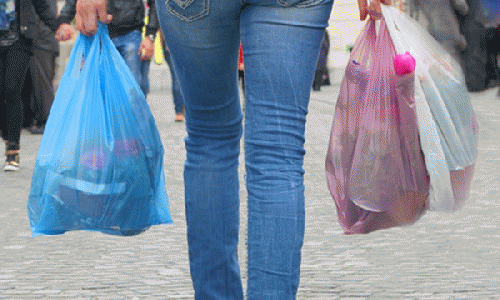Cross-posted from EcoWatch

“This important step forward shows that we can achieve lasting victories for ocean and environmental health.â€
(Image by Photo credit: Shutterstock) Details DMCA
The bill, which passed both houses of the California State Legislature now heads to the Governor's desk. If signed, California will become the first state in the U.S. to ban what advocates call "the most ubiquitous consumer item on the planet."
Senators Alex Padilla, Kevin de Leon and Ricardo Lara authored the measure that will implement a ban while promoting recycling and California manufacturing, and provides financial incentives to maintain and retrain California employees in affected industries.
"In crafting this compromise, it was imperative to me that we achieve the goals of doing away with single-use plastic bags, help change consumer behavior, and importantly, support and expand California jobs," said Senate President pro Tempore-elect Kevin de Leon (D-Los Angeles). "SB 270 is a win-win for the environment and for California workers."
Senate Bill 270 will:
- Increase the use of recycled content for reusable plastic bags to promote recycling and California manufacturing. In 2016, bags will be required to have 20 percent recycled content and in 2020 be made of 40 percent recycled content.
- Support recycling of agriculture plastic film which is currently sent to landfills.
- Require large grocery store chains to take back used bags for continued recycling.
- Require third party certification of reusable plastic bags to ensure compliance with bag standards which support California manufacturing.
- Grandfathers existing local ordinances related to grocery bags.
More than 120 California local governments have already banned single-use plastic bags with more than one in three Californians already living somewhere with a plastic bag ban in place, in an effort to drive consumers towards sustainable behavior change.
The Clean Seas Coalition, a growing group of environmentalists, scientists, California lawmakers, students and community leaders has worked since 2008 to reduce sources of plastic pollution, and help pass this legislation.
"Data from the over 121 local plastic bag bans, like Los Angeles City, Los Angeles County, San Jose and San Mateo has proven that bans are effective at reducing litter and changing consumer attitudes, and have refuted industry's claims of apocalyptic impacts on jobs and poor communities," said Leslie Tamminen, director Seventh Generation Advisors and facilitator for the Clean Seas Coalition. "A state plastic bag ban saves taxpayers huge amounts of money spent on litter cleanup, and protects the environment."
Plastic bags create a direct threat to wildlife, like the Pacific leatherback sea turtles, that mistake the bags for food. A study of more than 370 leatherback sea turtle autopsies found that one in three had plastic in their stomach, most often a plastic bag. Plastic bags are also one of the most common items littered on California's beaches according to Ocean Conservancy's annual beach cleanup data, according to Ocean Conservancy.
"This important step forward shows that we can achieve lasting victories for ocean and environmental health," said Nathan Weaver, oceans advocate with Environment California. "Nothing we use for a few minutes should pollute our ocean for hundreds of years. I congratulate Senators Padilla, de Leon, and Lara for their victory today, and I thank them for their leadership to protect our environment."
"The experience of over 120 cities shows that this policy works," concluded Weaver. "I urge Governor Brown to sign SB 270 into law."




